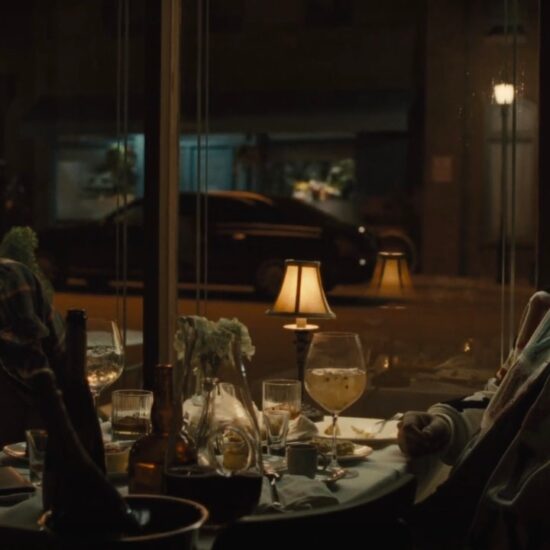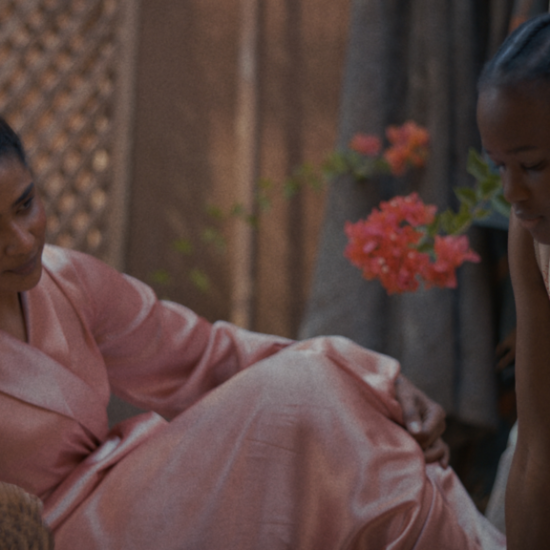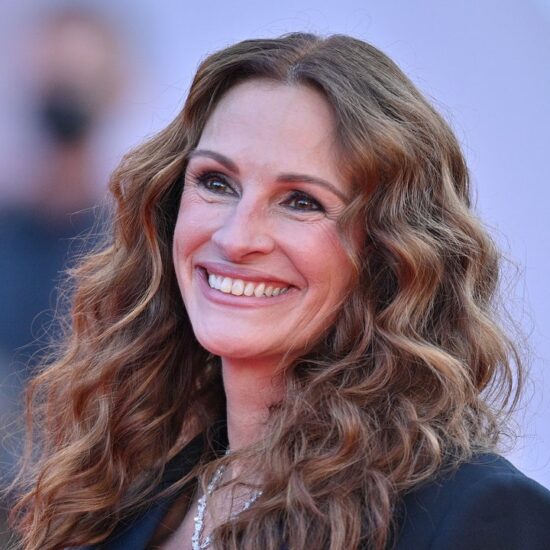
On the morning after Julia Reichert left us—but before I found out that she had—I dreamed that I was on a retreat in King’s Canyon in Northern California. We were all eating dinner in the dining hall, and someone stood up and started singing “Hallelujah,” and I stood up and joined in on the second verse. Then everyone else joined in. Then I woke up. Then it started to rain. Then I logged into Twitter and found out about Julia.
She was a warrior, an artist, an activist, a mentor, a teacher, a friend, a partner, a mother, and a grandmother. For half a century, she was a fierce advocate for the working class and the labor movement, for the feminist movement, and for independent filmmaking. She fought for the truth. And she fought her hardest battle, against cancer that would finally take her, for 16 years. She and Steve—himself, one of the most valiant and stalwart partners in love, life, and art one can find. But she kept doing what she did best—making films and sharing the love and joy, which came back to her in abundance. And in the end, there was peace. Bye, Julia. “You told the truth, you didn’t come all this way to fool us.”
We reached out to colleagues, contemporaries, and friends to share their thoughts with us. I would like to thank Ellen Brodsky at New Day Films for her help in reaching out, and our super intern at Documentary magazine, courtesy of the LA County Arts Commission, Kelsey Brown, for assembling the tributes and images.
_________________________________
Julia was a nonstop inspiration to me, as she was for so many others. Her work was always a great example of what I argued as cultural editor of In These Times and later as a scholar of documentary film: Independent documentary work can be a powerful intervention in democratic discourse if done with conscientious respect for the people whose untold stories you are telling. She was a filmmaker with the heart and soul of an organizer.
Our students at American University benefited enormously from Julia’s and Steve Bognar’s teaching, during one amazing year when her daughter was in Washington, DC. They wanted to be near their grandchild, and we all were lucky beneficiaries of their combination of care for family and care for the field. When I wrote a profile of her for Film Quarterly in 2019, I had no idea that Julia would go on to finish one film and make another—aided throughout by Steve’s extraordinarily loving care, artistic vision and professional expertise. Julia’s network of loved ones was huge, and that network is a tribute to her generosity throughout her life.
—Patricia Aufderheide
Professor, School of Communication at American University
Words cannot express our sorrow over the loss of our dear friend of more than 50 years and our co- founder of New Day Films. We have lost a part of our family. She will always be in our hearts and in our history.
With great sadness, Liane Brandon, Amalie Rothschild and Jim Klein,
Surviving Founders of New Day Films
The first time I met Julia Reichert—at the Sundance Film Festival in 2003—I blurted out, “You are my film hero!!!” in a really embarrassing, fan-ish way. But it was true. I had really struggled to make my film The Weather Underground. I had never made a feature-length film before, and so had no idea how I could tell the story of the radical political group through interviewing former members. At some point early in the process, I came across a VHS copy of Julia’s Oscar-nominated 1983 doc Seeing Red, a portrait of the American Communist Party. It was an amazing film and I watched it about 15 times to get a sense of the storytelling and arc and rhythms. In short, it became a road map and reference point for me in editing my own film. It’s funny, back then—and it really was a long time ago, before you could stream everything and look anyone up online—I had this intense relationship with Seeing Red, but I never had any idea who Julia Reichert was or if even she was alive. I was operating in my own little bubble.
So when she came up to me at the Sundance premiere of The Weather Underground and introduced herself out of the blue, that’s when I freaked out and blurted out to her that she was my idol! I certainly couldn’t have made my own film without hers. After that, I became fast friends with both Julia and Steve and crossed paths with them dozens and dozens of times over the years. One of the things that struck me most about them was that they really watched films! I saw them in the audience at festivals all over; they came to my shows many times. Many filmmakers don’t have the time or the inclination to watch other filmmakers’ work, but that wasn’t the case with them. They showed up, in spades. And in that way they were both the important glue holding together the doc community.
I loved and admired them both and was happy that when I had a screening at the Wexner Center a month or so ago, I drove out to Yellow Springs to pay my respects. It was clear that the end was near (even though that had been the case a number of times in the past; Julia fought harder than anyone I’ve ever known). I took some great photos of Julia in front of their house showing off her garden, and Steve took pics of me taking pics, which seemed appropriate. We are heartbroken to lose Julia, but her fierce and loving spirit lives on in her work and in the memories of her that we all carry in our hearts.
—-Sam Green
Filmmaker
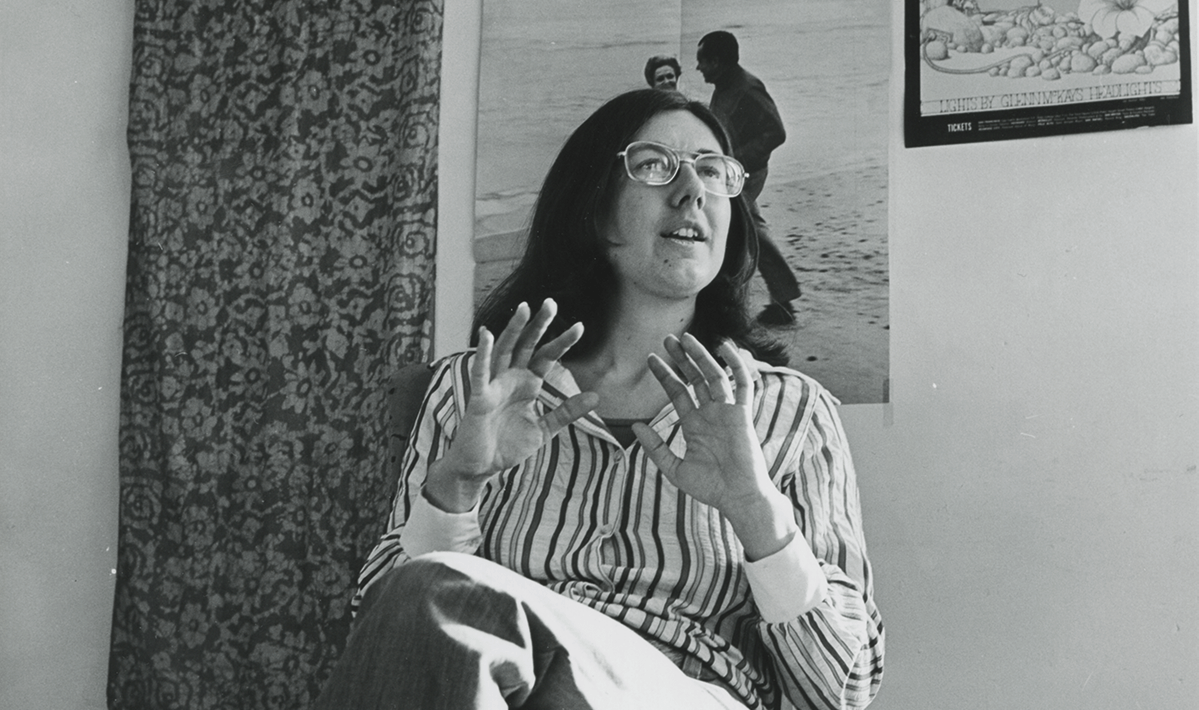 Julia and my role in the founding of New Day Films was an essential part of our lives. While Julia made wonderful films, her work building the independent filmmaking community will live on. Before DIY became a thing, Julia lived the idea. She even wrote a manual in 1977 titled “Doing It Yourself” that helped generations of filmmakers get their work out.
Julia and my role in the founding of New Day Films was an essential part of our lives. While Julia made wonderful films, her work building the independent filmmaking community will live on. Before DIY became a thing, Julia lived the idea. She even wrote a manual in 1977 titled “Doing It Yourself” that helped generations of filmmakers get their work out.
—Jim Klein
Co-Founder New Day Films (courtesy of New Day Films’ blog; thanks to Ellen Brodsky)
I first met Julia in the early ’70s, I think. She was in New York with Jim [Klein] to finish the methadone film [Methadone: An American Way of Dealing] and had stopped by the cutting room where Marc Weiss and I were working for director Emile de Antonio. I could hear them talking, laughing, and arguing, through the open door. At the end of the visit, D offered them the cutting-room space at night, and that’s where they finished the film. Marc and I, cut the negative after the film was locked—a first for both of us.
Those early years were very, very special. We were young, fierce, and stubborn; we worked and learned together and were passionate about our work. We had generous teachers who believed, as we did, that movies can make change. Julia never lost that spirit. It’s the way she lived her life and did her work.
I miss her deeply.
—-Mary Lampson
Editor/Director
Working as Julia’s directing/producing partner to make Union Maids was one of the most important experiences in my life, for which I’m eternally grateful. Julia was tried and true and never wavered in her commitment to social justice and the working class. She made a lasting mark on the world, on filmmaking, and I’m sure on her friends, family and community.”
—Miles Mogulescu
Co-Director/Producer, Union Maids
In the 25 years, I knew Julia, they were mainly in edit rooms, at film festivals, and once, I’m happy to say, when she and Steve stayed in my home while visiting their daughter. In this time, I don’t think I ever saw her say or do anything that was not somehow an expression of her love of labor, of cinema, or her family. This is not to say she could not be blunt, but she was always true to her beliefs, her commitments, her passions. The world seemed to give in to her passion— certainly I did—and I loved thinking with her and Steve about their films while they were being made. Such irreplaceable intimacy, complexity, and sheer fun. Julia was an extraordinary and wonderful person and while I am very sad at her passing, I am also immensely grateful to have known her.
—Robb Moss
Filmmaker/Chair of the Department of Visual and Environmental Studies at Harvard University
Julia Reichert led an extraordinary life, and with her collaborators made enormous contributions to the field of documentary filmmaking. She wanted her films to have consequences in the world and play a role in our democratic process.
From her earliest work, Growing Up Female, she has always been focused on community, the community portrayed in the film, the community of filmmakers behind the film, the community of viewers the film is for.
She’s always had a radical spirit. When a venue for distributing documentaries for social action didn’t exist, Julia joined with others to create new ones. In 1971, she founded New Day Films, an innovative collective approach to distribution still a leader today. She was part of creating the IFP, POV, ITVS and The Indie Caucus to get and keep independents on PBS.
It has been an honor to work with her over the decades. We share a commitment to place, and a Midwestern ethos of cooperation and mentorship to the next generation of documentary filmmakers. Her spirit lives on in the makers and organizations she cared so much about.
—Gordon Quinn
Filmmaker; Founder & Outgoing Artistic Direector of Kartemquin Films
If I had to describe what I consider her most important quality, among the many, it would be her ability to inspire others and create solidarity in a far-flung community of filmmakers and ordinary people who responded to her openly honest humanity.
—Amelie R. Rothschild
CoFounder, New Day Films (courtesy of New Day Films’ blog; thanks to Ellen Brodsky)
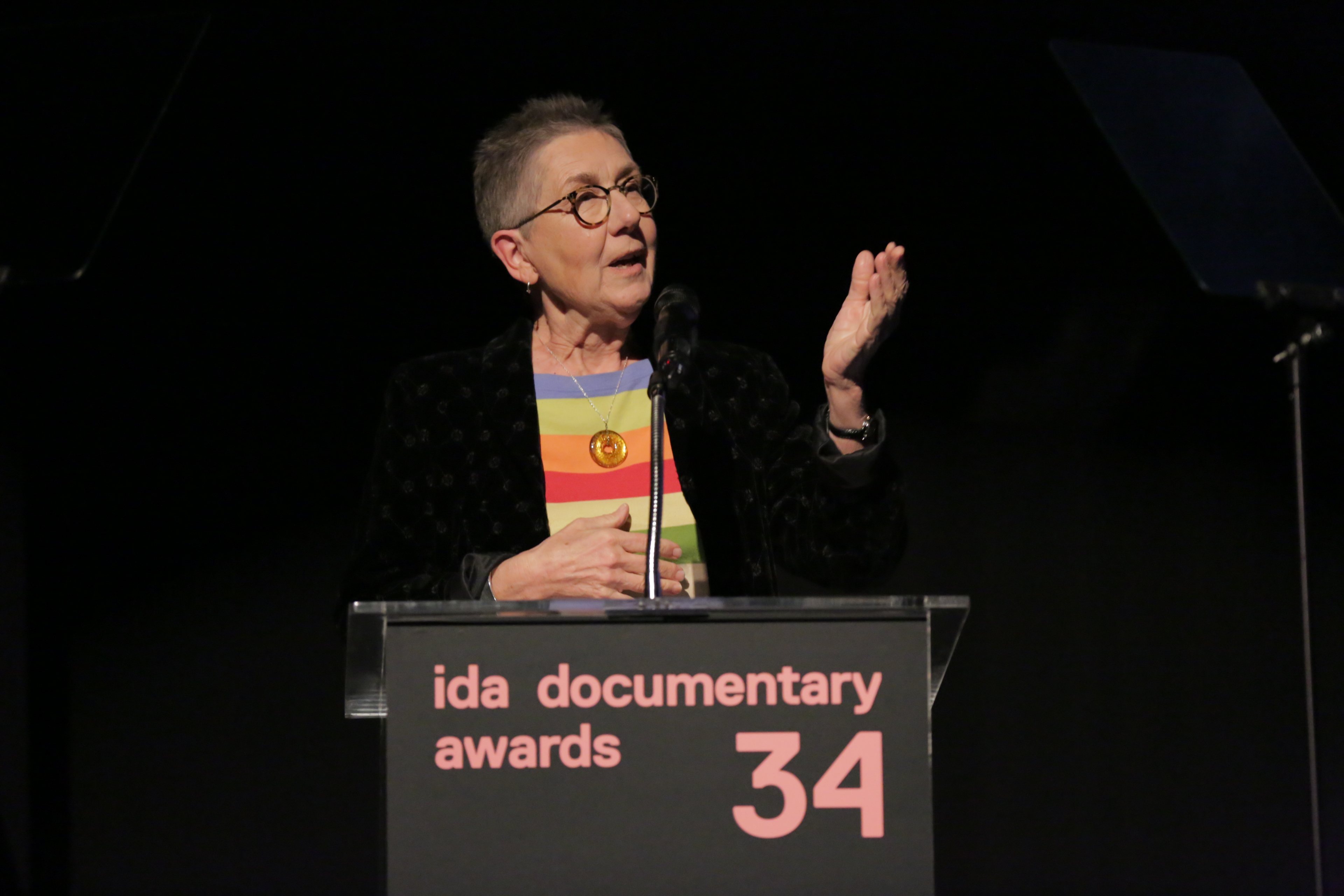 I had the privilege of meeting Julia Reichert in February 2020, the night before the Oscars at IDA’s Docuday, and I will never forget how she was so humble and down-to-earth. The world lost this groundbreaking documentary filmmaker.
I had the privilege of meeting Julia Reichert in February 2020, the night before the Oscars at IDA’s Docuday, and I will never forget how she was so humble and down-to-earth. The world lost this groundbreaking documentary filmmaker.
—Indira Somani
Filmmaker
I loved Union Maids and Seeing Red for the combination of passion and tactics, rooted in the awakening of ordinary people in political struggle, with a “no regrets” attitude in the face of setbacks. So we were thrilled that Julia (and Steve) wanted to tell our story in 9to5: The Story of a Movement. She captured our breadth, our fun, our strategy the way Julia always did—through the voices of workers: Renia, explaining that her organizer always made sure to pair old and young, and Black and white members on a project; Mary, who knew that despite failures, “it all mattered”; and Carol, reflecting that she stayed in the union because “it was the jazz of it”—the jazz of being in the fight.
Julie told me that in filmmaking, just as in organizing, you need to invest time in people so they know you really care about them and that it’s the members, not the leaders, who will reveal the strength of your effort. And Julia showed us through how she lived that, indeed, it did all matter, and it was the jazz of it.
—Karen Nussbaum
In 2013, We Always Lie to Strangers, a film that I made with David Wilson and Nathan Truesdell, was selected to open the St. Louis International Film Festival. When the three of us (and our families) arrived at the Tivoli Theatre for this homecoming screening (all three of us with deep Missouri ties), standing in the lobby were Julia Reichert and Steven Bognar. They had made the six-hour drive from Ohio to be there for us in that moment. We had never asked (because that’s a crazy thought to drive 12 hours round trip) and we were not told of their plans. They just wanted to be there to support their friends and sometime collaborators.That’s what it is to be in their orbit—to have two of the very best at your side, checking in, watching cuts, standing guard. And it’s an experience that dozens—no, hundreds—of fellow filmmakers and former students have had.
Julia’s stature at the forefront of American documentary over the last half-century is unquestioned. Her work behind the camera lives as a testament to her commitment to her rigorous yet humanistic practice. But it’s the often unseen moments of love and support that Julia offered, without expectation, to generations of filmmakers that so many of us are holding onto and will always carry with us.
—AJ Schnack
Filmmaker; Founding Director, Cinema Eye Honors; Co-Creator, Field of Vision
Hard to overstate Julia’s contributions to filmmakers, students of documentary, the international documentary landscape (and me personally!)
Julia’s first film partner (and former husband), Jim Klein, edited several of my film projects over the years and introduced me to Julia and New Day Films. It’s from Jim, Julia and New Day that I learned how to be a filmmaker and how to teach documentary to young people. Her work on national and international stages was matched by her work locally at Wright State University in Ohio and the scores of young people she, Jim and Steve Bognar trained for decades. Engaging budding filmmakers in Ohio was as important to her as engaging national “superstars.” And truthfully, many superstars hail from their program (including my colleague and friend Eric Risher.)
Our own Youth Documentary Academy in Colorado Springs is modeled heavily after the pioneering work of Julia, Steve and Jim. Their values of giving voice to everyday, ordinary people, of challenging systems of power that privilege some voices over others, of teaching young people that their stories matter and that, collectively, we hold much power in our own organizing—these have all infused every stage of my personal and professional life.
Above all else, Julia taught me what it is to be an independent storyteller. I had a chance to text with her a few weeks ago, and she reminded me not to forget the power and potential of that independence.
True to her spirit, she and Steve wrote many accounts of her journeys with cancer over the years—some devastating, some uplifting, all inspiring. That she used her illness, brilliance and honed storytelling skills to document what we as Americans have such difficulty talking about— illness and mortality—is not surprising to me. She lived her work and values everyday.
It’s hard to express in short paragraphs the impact of Julia Reichert on so many lives. Thankfully, her films, her family, and her students will stand as a powerful legacy.
As Marlene Booth says, “May her memory be a revolution.”
—Tom Shepard
Filmmaker/Founder Member, New Day Films
Tom White is Editor of Documentary magazine.









